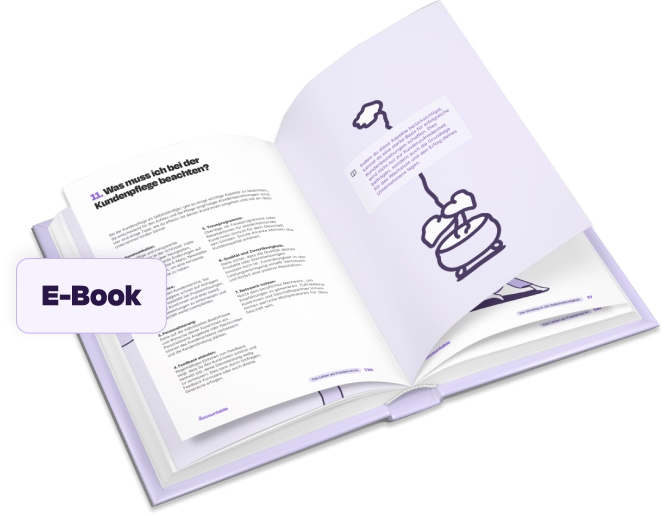When starting out in the world of self-employment, many freelancers find themselves having to deal with taxes for the first time. The different terms used for the various taxes that freelancers in Germany have to pay can be quite confusing.
What is the difference between Mehrwertsteuer und Umsatzsteuer? And what exactly is input tax? In this article, we shed some light on the differences between these terms and explain them in more detail.
The Umsatzsteuer is applied to all sales made by businesses in Germany. For each product sold or each service provided, companies and self-employed persons have to pay a certain percentage of their sales to the government. In most cases, it’s either 19% or the reduced amount of 7%.
➡️ Find out when you should use each value-added tax rate.
You can add the tax rate that applies to your business to your invoices. For example, if you issue a customer an invoice for €100, you still have to disclose the sales tax:
💡 Accountable tip: When you create your invoices using Accountable’s tax solution, the correct VAT rate is calculated automatically! Create invoices directly in the free app or on your laptop.
➡️Here you find are all the German tax terms you need to know
The Umsatzsteuer that you receive must be paid to your local tax office (Finanzamt). You determine the amount due in the Umsatzsteuervoranmeldung, which you need to submit annually, monthly or quarterly, depending on your tax office’s requirements.
On this form, you not only declare the amount of VAT you have received and that you will remit to the tax office, you also have the opportunity to reclaim the VAT you have paid for in purchases relevant to your business.
Example:
You are a fashion designer, and you purchase fabric worth €100 + €19 VAT. This purchase is necessary for your job.
This means you can claim the €19 you paid in your next Umsatzsteuervoranmeldung. The €19 will then be offset against the amount of sales tax you have to pay.
💡 Accountable tip: You can be exempt from paying Umsatzsteuer if you are considered a small business owner. This can be helpful, for example, if you have almost no business expenses or work mostly with private customers. The exemption from sales tax makes it easier for your to offer lower prices to your customers. This article explains when it makes sense to make use of the small business regulation.
The term Mehrwertsteuer is identical to Umsatzsteuer. However, Mehrwertsteuer is more of a colloquial term. If you want to express yourself correctly when it comes to tax law, you should always use the term “Umsatzsteuer”.
Nevertheless, the term Mehrwertsteuer is mainly used on receipts. If you look on your most recent receipt from your evening out at a restaurant or your last shopping trip, you will no doubt find the abbreviation “MwSt.”, which indicates the calculated sales tax.
The origin of the term “Mehrwertsteuer”
Mehrwertsteuer came to be due to the introduction of the value-added principle, which has been in effect in Germany since the end of the 1960s. This means that companies and self-employed persons only have to pay sales tax on the value that is created when selling a product or service. So, if you incur expenses in the process of offering your product or service, these expenses can be deducted from the income generated. The sales tax only has to be paid on the surplus, i.e. the added value.
Let’s stick with our example from before:
The term Vorsteuer (input tax) differs from Umsatzsteuer (VAT) only from the perspective of the invoice payer. Businesses account for sales tax on their products and services, and in turn, must pay input tax on products and services they purchase.
Let’s use our fashion designer example to illustrate the difference:
In other words, incoming invoices show Vorsteuer, whereas outgoing invoices list Umsatzsteuer. The amount is the same, only the term changes depending upon whether you are sending or receiving the invoice.
The topic of taxes can be quite complicated. A basic overview of the different terms can help you to get a better grasp of the topic. Let’s take a look at all three terms one more time so you no longer have to wonder what the difference is between Umsatzsteuer, Mehrwertsteuer and Vorsteuer.
It is actually quite simple because as a self-employed person, the term Umsatzsteuer is probably the most important. This is because you show Umsatzsteuer on your invoices and pay this in turn to the tax office.
Mehrwertsteuer refers to the exact same tax and is a colloquial term that is more commonly used.
Vorsteuer is also just another term for Umsatzsteuer. It is the tax amount you pay for professional expenses.
💡Accountable is the tax solution for the self-employed. Download the free app or create an account directly online. This ensures you have your accounting and tax obligations under control right from the start. This includes the Umsatzsteuervoranmeldung (advance VAT return), Einkommensteuer (income tax) and all other tax returns that self-employed professionals have to file.
20 Kapitel knallhart recherchiert und vom Steuerprofi geprüft
Kostenlos herunterladen

Author - Sophia Merzbach
Sophia has been a key member of the Accountable team for many years, bringing a unique blend of journalistic precision and in-depth tax expertise to her work.
Who is Sophia ?Thank you for your feedback!
Useful
How much income tax is deducted from your income is largely determined by your tax class. There are ...
Read moreWorking as a self-employed professional has many advantages: You are your own boss and you can choos...
Read moreWorking with international clients can be tricky, depending on where exactly they’re located, whet...
Read moreIch kann ohne Accountable nicht, auch sehr familiäre Unterstützung, tolle Erfahrung bis jetzt
Ayhan Kahraman
Der Austausch und die Hilfe ist SUPER.
Katja Schmidt
Accountable ist sehr einfach zu bedienen. Und macht Steuern für Solo selbständige so einfach wie nie zu vor.
Anonym
Accountble ist einfach zu bedienen und übersichtlich.
Regine Müller-Waldeck
Die Kommunikation war sehr gut und sehr genau. Im Fall wie es bei mir war hätte ich mich gefreut ein Telefonat zu führen. Es wäre auch sehr gut eine Telefonnummer zu haben wo man sich an einen Mitarbeiter wenden hätte können. Heute bekommt man sehr viele Spam Nachrichten die täuschend echt sind.
Peter Goerke
Ich bin schwer begeistert, die Platform ist wirklich ausgereift, man ist kein Versuchskaninchen, außerdem ist es trotz Digitalisierung sehr persönlich und direkt, ich fühle mich richtig aufgehoben und die Kundenservice ist unübertroffen, einziges Manko ist das ext. Steuerbüro Consentes, auf Fragen wird nicht oder spät geantwortet, verlangen jedoch einen horrenden Betrag nur um mit dem Finanzamt zu sprechen, da greife ich lieber selber zum Hörer, das soll das Erlebnis mit Accountable, aber in keinem Fall schmälern, endlich eine All-in-One Lösung, die hält was Sie verspricht!
Anonym
Bis jetzt alles Top, guter Sapport.
John Niehaus
sehr guter technischer support zum Abo. Steuerfragen hatte ich noch nicht.
Sergej Rothermel
Sehr guter Kundenservice, individuell und verständlich. Ausgezeichnete Fachkompetenz! Besser als jeder Steuerberater hier bei uns. Absolut empfehlenswert!
Birgit Kleinert
Zuerst einmal möchte ich mich ganz herzlich bedanken, für die intensive und professionelle Betreuung meiner Steuerangelegenheit. Bei wirklich all meinen Fragen und es waren nicht wenige, hat Daniela mir geholfen. Besonders hervorheben möchte ich, das man hier auf eine Frage die man bezüglich der Steuer stellt, nicht lange auf seine Antwort warten muss. Accountable, ein "Rund-um-Sorglos-Paket"! Vielen Dank Peter Albuscheit
Peter Albuscheit